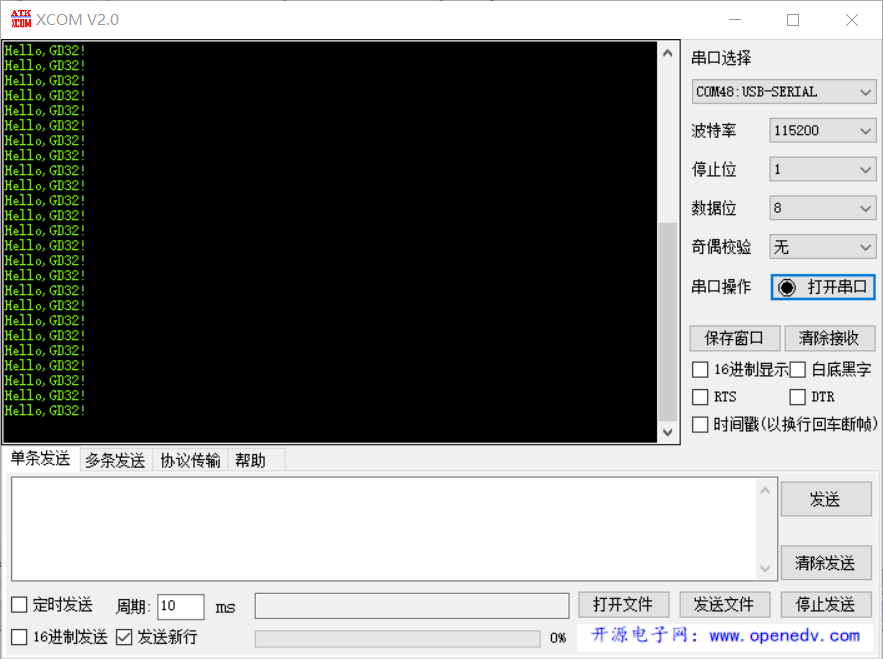代码如下
usart.c
#include "usart.h"
#include "gpio.h"
UART_HandleTypeDef usart0;
void My_Usart_Init(void)
{
/* USART configure */
usart0.usart_periph = USART0;
usart0.Init.BaudRate = 115200U;
usart0.Init.WordLength = USART_WL_8BIT;
usart0.Init.StopBits = USART_STB_1BIT;
usart0.Init.Parity = USART_PM_NONE;
usart_deinit(usart0.usart_periph);
usart_baudrate_set(usart0.usart_periph,usart0.Init.BaudRate);
usart_word_length_set(usart0.usart_periph,usart0.Init.WordLength);
usart_stop_bit_set(usart0.usart_periph,usart0.Init.StopBits);
usart_parity_config(usart0.usart_periph,usart0.Init.Parity);
usart_receive_config(usart0.usart_periph,USART_RECEIVE_ENABLE);
usart_transmit_config(usart0.usart_periph,USART_TRANSMIT_ENABLE);
usart_enable(usart0.usart_periph);
usart_interrupt_enable(usart0.usart_periph, USART_INT_RBNE);
usart_interrupt_enable(usart0.usart_periph, USART_INT_ERR);
nvic_irq_enable(USART0_IRQn,0,0);
}
void My_Usart_MspInit(void)
{
GPIO_InitTypeDef GPIO_InitStruct = {0};
/*GPIO Port Clock Enable */
rcu_periph_clock_enable(RCU_GPIOA);
/*Usart0 Clock Enable */
rcu_periph_clock_enable(RCU_USART0);
/**USART0 GPIO Configuration
PA10 ------> USART0_RX
PA9 ------> USART0_TX
*/
/*Configure GPIO pin : PtPin PA9*/
GPIO_InitStruct.gpio_periph = GPIOA;
GPIO_InitStruct.mode = GPIO_MODE_AF;
GPIO_InitStruct.pin = GPIO_PIN_9;
GPIO_InitStruct.otype = GPIO_OTYPE_PP;
GPIO_InitStruct.speed = GPIO_OSPEED_50MHZ;
GPIO_InitStruct.pull_up_down = GPIO_PUPD_PULLUP;
GPIO_InitStruct.alt_func_num=GPIO_AF_1;
gpio_af_set(GPIO_InitStruct.gpio_periph,GPIO_InitStruct.alt_func_num,GPIO_InitStruct.pin);
gpio_mode_set(GPIO_InitStruct.gpio_periph,GPIO_InitStruct.mode,GPIO_InitStruct.pull_up_down,GPIO_InitStruct.pin);
gpio_output_options_set(GPIO_InitStruct.gpio_periph,GPIO_InitStruct.otype,GPIO_InitStruct.speed,GPIO_InitStruct.pin);
/*Configure GPIO pin : PtPin PA10*/
GPIO_InitStruct.gpio_periph = GPIOA;
GPIO_InitStruct.mode = GPIO_MODE_AF;
GPIO_InitStruct.pin = GPIO_PIN_10;
GPIO_InitStruct.otype = GPIO_OTYPE_PP;
GPIO_InitStruct.speed = GPIO_OSPEED_50MHZ;
GPIO_InitStruct.pull_up_down = GPIO_PUPD_PULLUP;
GPIO_InitStruct.alt_func_num=GPIO_AF_1;
gpio_af_set(GPIO_InitStruct.gpio_periph,GPIO_InitStruct.alt_func_num,GPIO_InitStruct.pin);
gpio_mode_set(GPIO_InitStruct.gpio_periph,GPIO_InitStruct.mode,GPIO_InitStruct.pull_up_down,GPIO_InitStruct.pin);
gpio_output_options_set(GPIO_InitStruct.gpio_periph,GPIO_InitStruct.otype,GPIO_InitStruct.speed,GPIO_InitStruct.pin);
}
usart.h
#ifndef __USART_H_
#define __USART_H_
#include "main.h"
/**
* @brief UART Init Structure definition
*/
typedef struct
{
uint32_t BaudRate; /*!< This member configures the UART communication baud rate.
The baud rate is computed using the following formula:
- IntegerDivider = ((PCLKx) / (8 * (OVR8+1) * (huart->Init.BaudRate)))
- FractionalDivider = ((IntegerDivider - ((uint32_t) IntegerDivider)) * 8 * (OVR8+1)) + 0.5
Where OVR8 is the "oversampling by 8 mode" configuration bit in the CR1 register. */
uint32_t WordLength; /*!< Specifies the number of data bits transmitted or received in a frame.
This parameter can be a value of @ref UART_Word_Length */
uint32_t StopBits; /*!< Specifies the number of stop bits transmitted.
This parameter can be a value of @ref UART_Stop_Bits */
uint32_t Parity; /*!< Specifies the parity mode.
This parameter can be a value of @ref UART_Parity
@note When parity is enabled, the computed parity is inserted
at the MSB position of the transmitted data (9th bit when
the word length is set to 9 data bits; 8th bit when the
word length is set to 8 data bits). */
uint32_t Mode; /*!< Specifies whether the Receive or Transmit mode is enabled or disabled.
This parameter can be a value of @ref UART_Mode */
uint32_t HwFlowCtl; /*!< Specifies whether the hardware flow control mode is enabled or disabled.
This parameter can be a value of @ref UART_Hardware_Flow_Control */
uint32_t OverSampling; /*!< Specifies whether the Over sampling 8 is enabled or disabled, to achieve higher speed (up to fPCLK/8).
This parameter can be a value of @ref UART_Over_Sampling */
} UART_InitTypeDef;
/**
* @brief UART handle Structure definition
*/
typedef struct __UART_HandleTypeDef
{
uint32_t usart_periph; /*!< UART registers base address */
UART_InitTypeDef Init; /*!< UART communication parameters */
} UART_HandleTypeDef;
extern UART_HandleTypeDef usart0;;
extern void My_Usart_Init(void);
extern void My_Usart_MspInit(void);
#endif
bsp_usart.c
#include "bsp_usart.h"
#include "usart.h"
#include <stdio.h>
#include <stdarg.h>
#include "string.h"
uint8_t usart0_buf[128];
uint16_t len = 0,i;
//printf redefine
void usart0_printf(const char *fmt,...)
{
static va_list ap;
va_start(ap, fmt);
vsprintf((char *)usart0_buf, fmt, ap);
va_end(ap);
len = strlen((const char *)usart0_buf);
for(i=0;i<len;i++)
{
while (RESET == usart_flag_get(usart0.usart_periph,USART_FLAG_TC));//Ñ»··¢ËÍ,Ö±µ½·¢ËÍÍê±Ï
usart_data_transmit(usart0.usart_periph,(uint32_t)usart0_buf[i]);
}
}
uint8_t value;
void USART0_IRQHandler(void)
{
if(RESET != usart_interrupt_flag_get(usart0.usart_periph, USART_INT_FLAG_RBNE))
{
/* receive data */
value = (uint8_t)usart_data_receive(usart0.usart_periph);
usart_interrupt_flag_clear(usart0.usart_periph,USART_INT_FLAG_ERR_FERR);
}
}
测试图如下






